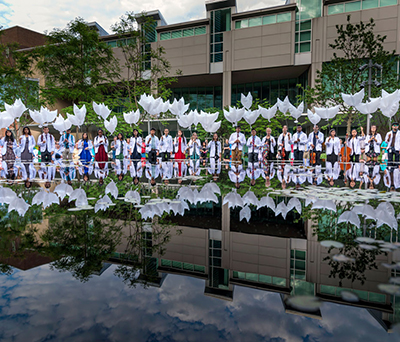
Have you ever considered donating your body to science? This selfless gift has far-reaching effects in helping medical students gain an in-depth understanding of the human anatomy — which is the absolute core of a medical education. The knowledge gained by the medical students, residents, fellows and clinical researchers is used to help improve the health of generations to come.
You or your loved ones might have many questions as you consider becoming a body donor. Here are some of the most common ones:
What do I need to do to become a donor?
You must complete the Washington University Gift of Body Donor Form and return it to the Body Donor Program office. This form must be on file with the University prior to the death of a potential donor.
May I request that my donation be used for research of specific illness or disease?
No. Our donor bodies are used to teach anatomy in all its various forms to our students, residents and doctors. We cannot accept requests for specific uses.
Are there age limits for this program?
You must be at least 18 to register to become a donor in the Washington University Body Donor Program. There is not an upper age limit for registration in the program.
May I donate my organs too?
The entire body must be donated to the program. The only tissues that can be removed prior to a donors’ delivery to the Gift of Body Donor Program are the eyes and brain. Any donation involving organs or tissues other than the eyes or brain eliminates the possibility of the donor becoming a teaching specimen. Donor bodies with organs removed (other than the eyes and brain) will not be accepted.
What does the University do with the donor body?
We use our donor bodies to teach anatomy in all its various forms to our students, residents and doctors. Donors are used in the classroom and in surgical settings.
What is done with the donor body when teaching has been completed?
Currently, all donor tissues are cremated and the cremated remains are scattered at Washington University’s Memorial Grove at Tyson Research Center near Eureka, Missouri.
Is there a memorial service for the donors?
Students who benefit from donations to the School of Medicine host an annual Donor Appreciation Remembrance service where they recognize donors and donor families.
The appreciation ceremony
The appreciation ceremony is held on the medical school campus at the end of every school year and is capped off with the releasing of dove-shaped environmentally balloons – each one representing a donor from the past year.
“The appreciation ceremony at the end of the anatomy course allows students to reflect on the gift the donors have made for the purpose of their medical education,” said Amy Bauernfeind, PhD, an assistant professor in the Department of Neuroscience and director of the university’s Body Donor Program. “The students realize how much they have learned from a single person, which is a very powerful experience for them. They feel humbled that one person can impact their own lives so profoundly without saying a word.”
Here are a few of the student’s thoughts as they remember they paid tribute:
“We wanted to extend our gratitude to the family and friends of the body donors, as well as the general public. We thought the symbolism of a dove would be appropriate in terms of peace, love and new beginnings.”
“Meeting the first patient — a donor human body — is considered such a seminal moment in becoming a doctor.”
“I’ve never had an experience where in such a short time, someone has taught me so immensely without ever saying a word to me.”
“I am honored and valued their sacrifice. I would want them to know that there is no better way to learn anatomy than this.”
“This person had lived his entire life with loved ones and had done amazing things, is now there on the table for me — such an incredible honor.”
“The individuals who have chosen to make an unselfish, invaluable gift by donating their bodies for this worthy purpose have left a truly noble legacy.”
“Once I met my first patient, I immediately felt calm with the knowledge that my donor would teach me immensely in a few short months. I felt grateful and reverent for the sacrifice that the donors and their loved ones had made for our education and the service we will provide our future patients.”
For more information please contact the Gift of Body Donor Program about the body donor program call 314-362-3597, 314-362-3599 or 855-502-7894. Or visit bodydonorprogram.wustl.edu